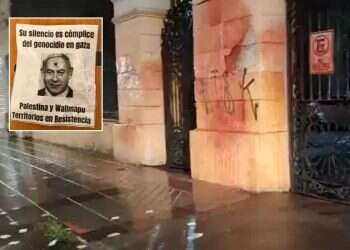The United States federal government is ready to help ahead of the Passover holiday as too many Jewish institutions are wondering if they'll be next. Too many in Brooklyn, NY, and elsewhere already deal with the reality of antisemitic attacks that keep on coming.
Follow Israel Hayom on Facebook, Twitter, and Instagram
Marcus Coleman, director of the US Department of Homeland Security Center for Faith-Based and Neighborhood Partnerships, sat down one-on-one with JNS to explain what resources are available for those looking to secure their facilities and worshippers, and what steps can be taken to ensure that this Passover is a safe one for American Jews.
"We had a conversation last week with faith leaders and really focused on practical steps to do self-assessment for facilities – how to take care of your people – and then just some reminders. I think one of the things that I've been humbled by in speaking with faith leaders across the country is that a lot of places still are operating at maybe 50% capacity, or they have just a few people coming in,"
"We know those folks are preparing for the spring. They're expecting big crowds. So, we want to provide all available resources from the federal government to help make sure that they can gather safely," said Coleman, who hosted a webinar last week titled, "Protecting Places of Worship: A Religious Observance Briefing on Safety and Security."
He indicated that as many as 1,200 people attended the webinar – one of a number of engagements on the issue of synagogue security. More than 1,800 people have attended an ongoing webinar series on the Nonprofit Security Grant program since the start of the calendar year.
'Increased threats on the Jewish community'
Coleman told JNS that the focus for religious leaders, including those preparing for Passover, Easter and Ramadan, should be one of three areas of concern, the first being the threat landscape.
"There's been increased threats and attacks on the Jewish community and on multiple faith organizations, and we gave a briefing that provided a sense of the threat landscape and the types of threats particular faith communities have faced over the past few years. The Department of Homeland Security, under the leadership of Secretary Alejandro Mayorkas, has developed a Mitigating Attacks Against Houses of Worship Guide and that includes the self-assessment. And, so, using that self-assessment, check your facility to make sure that you're thinking about inflow and outflow, having the right relationships with local first responders, and then, of course, taking care of your people.
"And so, we presented some information on a training called 'Until Help Arrives.' We know a lot of people like to take trainings, and it's been encouraging to hear faith leaders finding some of our DHS trainings around active shooter and active assailant threats valuable. But in addition to that, we have trainings and help people know what to do before help arrives. In addition to calling 911, being able to stop bleeding, if necessary, and just being that first responder because usually, we're going to have citizen first responders until the actual first responders arrive," Coleman explained.
Funds to protect synagogues and other religious institutions are available through the Nonprofit Security Grant Program. The recently passed federal budget includes a 40% increase in funding available for the program.
"It's a program that essentially is responsible for helping to provide funding for what we talk about in terms of facility hardening activities – that's everything from purchasing security cameras to affording people the opportunity to take on additional trainings and get contract support for security for their facilities. We know a number of people may not have the means to afford a full-time, private institutional security organization on their own. And so, that particular grant program also provides opportunities to get contract security as well.
"We are [holding] webinars and outreach virtually as well on that particular program. I believe it's upwards of $250 million for this grant cycle, and we anticipate we're going to get a lot of need there. We know that that's not the only source of funding available for houses of worship, but that is the part that the federal government is making as a contribution to help those security professionals keep their facilities secure, and more importantly, their people safe," Coleman said.
He added that "we've gotten a number of inquiries – upwards into the thousands – in terms of not just what to do to apply for the grant program, but what other partners and resources and steps can people take today. And that's something that we're going to continue to be committed to doing."
'Making sure people are prepared'
DHS and other law-enforcement agencies around the country get put under a microscope each time there is a terror attack on a synagogue that garners headlines. Coleman said federal agencies are listening to religious leaders and implementing the lessons learned from such tragic incidents.
"I was asked a similar question by the US Senate when we talked about domestic violent extremism – what we're doing across the government institutions. And I appreciated the senators' passion across the board for making sure that we're listening to faith leaders in applying those lessons learned. I'd say, number one, that we've given faith leaders, especially those that have been successful either applying for the nonprofit security grant – or in Congregation Beth Israel's case, to have the best possible outcome from an attack like that – is make sure that you really take the time to not only test, but practice and have conversations within your facility."
"Oftentimes, for many faith leaders, it's overwhelming," acknowledged Coleman. "We don't want faith leaders to go alone. And so, we have actually consolidated a lot of the resources on fema.gov/faith that walk through the federal resources and information available from across government."
"Number two, in terms of making sure people are prepared, you may have a security lead for your Jewish community center, for your synagogue, for your place of worship or another facility, but it's not just that person's responsibility to know how to keep a facility safe and secure. Keeping other people involved in providing opportunities to connect to trainings and resources, particularly those leaders of other programs in your facility, is helpful," he said.
Subscribe to Israel Hayom's daily newsletter and never miss our top stories!
"And then the third piece is relationships. I've been touched by hearing not just from the rabbi of Congregation Beth Israel; there's been a number of faith leaders that I've connected with. They talk about the value of building relationships before incidents occurred. It's those types of relationships that really help you get connected. And so, you may be talking to local law enforcement because there's something that recently happened … build that relationship with local first responders now, build that relationship with DHS," he encouraged. "In our webinar, we talked about how you can get connected to fusion centers that provide information for threats and specific areas. Those relationships are going to be incredibly important."
'Better outcomes for many of our faith partners'
DHS also provides protective security advisers across the country. According to Coleman, these are individuals responsible for helping with assessments for facilities, which include houses of worship, and are resources to help facilitate introductions to other state and local law-enforcement officials, if that is needed as well.
In terms of preventative measures, there has been a call to create some sort of federal task force – either under the auspices of DHS, FBI or other law enforcement agency – to connect the proverbial dots before there's an attack, allowing for interagency connection and information sharing that may have prevented missing the type of red flags that could have been spotted prior to the Colleyville attack. Coleman told JNS that he supports that type of call and that the White House Office of Faith-Based and Neighborhood Partnerships is spearheading an Interagency Policy Committee (IPC) to work on such issues.
"We've been able to meet with several faith leaders, including leaders representing Agudath Israel of America, Secure Communities Network, which now sits on the DHS Homeland Security Advisory Council, and others. IPC, from the federal government's position, is providing us an opportunity to really help and hone in on what are some practical things that we need to be doing in a more coordinated fashion that's going to result in better outcomes for many of our faith partners," Coleman said.
"One example is we're looking at is doing an even more robust effort to have a one-stop-shop of best practices and information similar to schoolsafety.gov for faith-based and community-based organizations," he noted. "That's something that's also been called on from Congress, and many faith leaders and community leaders have asked for something similar as well."
Reprinted with permission from JNS.org.




